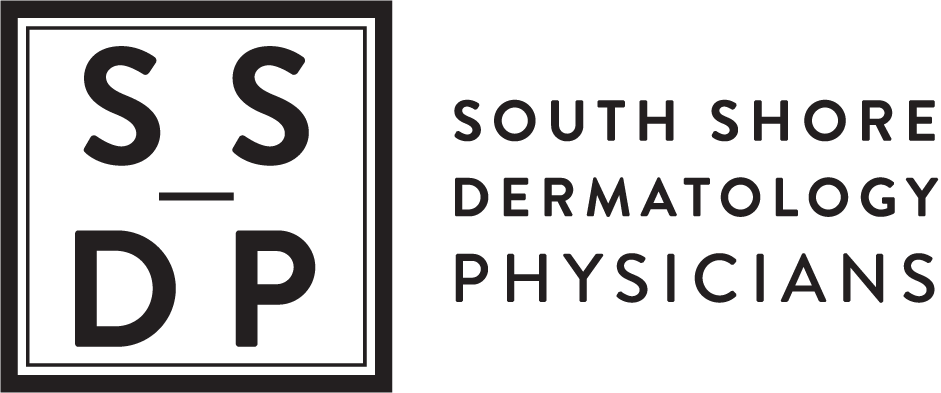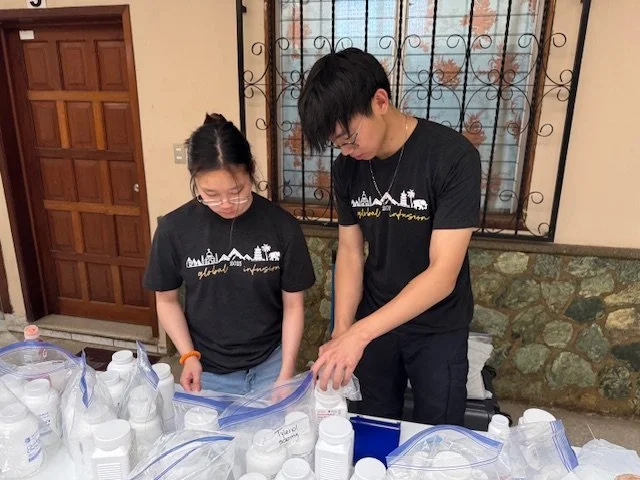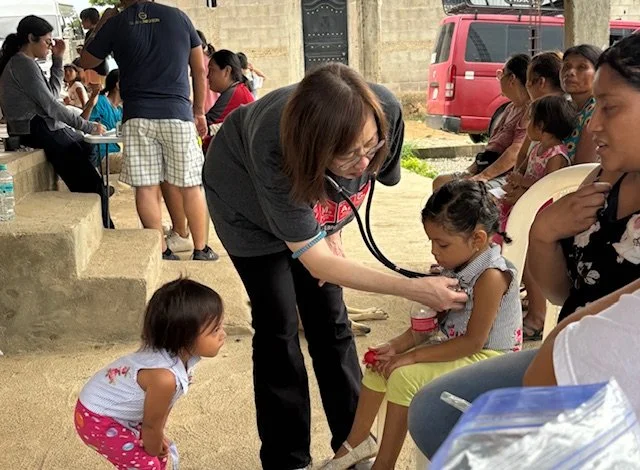A Medical Missionary Trip to Chiquimula, Guatemala
Healing in the Highlands
From the last week of June into July, Dr. Kyung Chang, her daughter Sophiette, my son Andy, and I traveled to the sun-drenched hills of Chiquimula, Guatemala—not merely equipped with medical supplies, but with a shared commitment to listen, serve, and uplift communities without access to healthcare. Through Global Infusion, an international missions organization, we teamed up with a local church, APV (Auténtica Palabra de Vida, translated from Spanish, “The Authentic Word of Life”), to provide general medical care, health education, and spiritual support to underserved neighborhoods.
Our Team
Weeks before our arrival, announcements were made about the location and times of the free clinics. We worked closely with the Cordero family (Nathan, Jane, and Amy), who run the church that hosted our trip, and the Granthem sisters (Anna, a missionary-in training, and Joy, part of the earlier medical mission team) to provide medical care. A focused history and vital signs were collected by Nathan, then the patients were directed to Dr. Chang or me while Amy and Jane served as translators.
After more questioning and a brief exam, the patients took their prescriptions to Sophiette and Andy, who served as pharmacy staff, counting, splitting, and distributing medications. Most patients had children in tow, so Anna and Joy had crafts and games to keep the children entertained.
Our Daily Contributions
Our first clinic was in El Banvi, a rural neighborhood tucked within the Chiquimula region. After a morning of orientation and organizing our mobile pharmacy (a large, random assortment of medication left by the previous team), our medical team—Dr. Chang, Sophie, Andy, and I—embarked on the first outreach of the week.
In a makeshift clinic, just the corner of a local apartment building courtyard, our team triaged dozens of community members. Children lined up shyly while running around their parents, followed by elders who had gone years without basic healthcare. The triage team offered basic health screenings, including blood pressure and glucose checks, and took chief complaints. The medical team, including myself, followed up with more in-depth medical consultations and provided much-needed medication.
Despite the limited supplies, we tailored each prescription with care—antifungals for persistent skin infections, antibiotics, and multi-vitamins for adults and children were among the most frequently distributed. For many adult patients with chronic shoulder and neck pain, hypertension, obesity, and diabetes, the best prescription was emphasizing the importance of daily exercise and changes in nutrition.
Dr. Loo explains to a young mother the dosing and frequency of an antibiotic for her child
Most rewarding was the gratitude we received in return—not in words, but in warm smiles, lingering handshakes, and most of all, thanks. In El Banvi, we weren’t just treating symptoms; we were continuing a consistent foundation of hope built by all those who came before us.
Day 2
On our second day, we visited El Olam Christian School in Camotán, a local school for grades one through nine. It was originally founded by the Cordero family, who run the APV church that hosted our trip. Nestled among Guatemala’s western mountains, El Olam educates nearly 100 children, most of whose families had never had routine check-ups. That day, we transformed the school’s hallways into a fully functioning clinic.
Once again, Dr. Chang and I led patient consultations with local families and students, while Sophie and Andy managed the pharmacy, ensuring the right medications were matched to each case. Our translators provided triage and support, checking vitals and walking families through the process.
That afternoon, we diagnosed several cases of untreated strep throat, infections, and chronic malnutrition. Children who had never owned a toothbrush received basic hygiene education, and parents were given guidance on long-term care strategies. Though the day ended with a trip to the nearby mountain hot springs, the real rejuvenation came from witnessing these children being empowered with both knowledge and health.
Families lining up as we set up our clinic stations in El Maestro, one of our clinic locations
Sophiette and Andy splitting and counting pills
Keeping children of families entertained during the visit
Dr. Kyung Chang listening to a pediatric patient’s heart
The Power of Presence
Over four clinic days, we cared for roughly 300 individuals: children who ran barefoot and had hungry stomachs, mothers and fathers who carried worry in their posture. Each encounter was both a medical interaction and a moment of human connection.
What struck me most during this experience wasn't just the volume of need, but the severity of it. Families didn’t come to us simply because we were there. They came because they had no other option. Many had multiple children, limited access to clean water or food, and no means to see a physician, let alone afford consistent care. They weren’t looking for convenience. They were seeking survival out of necessity.
And yet, despite it all, there were genuine, enduring smiles. Children laughed as they played barefoot in the dirt. Parents thanked us with tearful eyes, not just for the medicine, but for showing up and caring. They celebrated life not because it was easy, but because it was theirs.
Their joy wasn’t rooted in material possessions or comfort. It was born from gratitude, faith, love of family and community, and a deep strength that comes from enduring without bitterness. They were simply happy and grateful for the gift of existing, for another day under the sun, for the chance to keep going even in the face of sickness and uncertainty.
The contrast to our first-world society was stark. We live surrounded by abundance: clean water on demand, fully stocked refrigerators, the convenience of urgent care and health insurance, and yet we so often find ourselves consumed by anxiety, dissatisfaction, and the pursuit of a perpetual “more and more.” We scroll past joy, compare endlessly, and grow restless in the face of each and every minor discomfort. Meanwhile, in Chiquimula, those with the least reminded me what it truly means to be rich in spirit: to wake up each day with resilience, to smile despite sorrow, and to find peace in simply being alive.
Their strength and contentment inspired me. And above all, their grace reminded me that joy is not found in what we possess, but in how deeply we choose to live.
A Final Reflection on Service
In the moments I spent alone between patient consultations and pharmacy lines, I found myself reflecting not just on medicine, but on meaning.
This mission reminded me that healthcare, at its core, is not about how many patients you can see in a set period of time or how much medication you give out. It is about presence. It is about crouching down to meet a child's eyes as you check their temperature, about slowing down enough to let the translator explain to a mother what her child’s diagnosis means in her own language, her own context, her own world. It is about listening as much as treating. Sometimes, it is about simply being there when no one else has been.
In Guatemala, we didn’t bring perfection, but we brought presence. We didn’t solve poverty or its roots, but we brought healing to address many immediate problems. And as we worked with the local church, translators, and community, all of whom have been serving this community far longer than we have, we realized that the most powerful kind of service is the kind that joins hands with what’s already been built.
The Potential to Impact a Life
There is still so much to do. But what gives me hope is that every act of care carries the potential to impact a life, even just a little. A blood pressure check may delay a stroke. A multivitamin tablet might strengthen a child’s immune system. A listening ear might make someone feel seen for the first time in years. In a world that glorifies speed, this trip taught us to honor slowness.
In a culture that rewards outcomes, we found value in the process. And in a society that often measures worth by what you own, we found joy in what can never be bought: connection and gratitude.
Auténtica Palabra de Vida—the Authentic Word of Life. This is not just the name of the church that hosted us, but a reflection of the purpose and intention we carried that entire week: that healing is most powerful when it is rooted in authenticity, guided by compassion, and spoken through empathy and the willingness to serve others.
The entire team (from left to right): Dr. Daniel Loo, Joy, Amy, Beverly, Anna, Andy, Nathan, Jane, Osaias, Dr. Kyung Chang, Sophiette
Please contact SSDP to schedule an appointment with any of our board-certified dermatologists.







